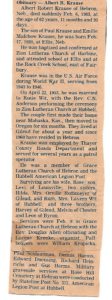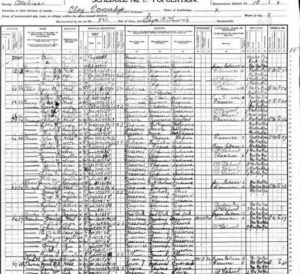 Know What You Know
Know What You Know
One of my biggest pet peeves when researching my family tree is people (especially on Ancestry) who just click and call it good. Pretty soon someone else comes along and sees that information and assumes it is correct…without asking, …and they add it to their tree …and soon you have a lot of misinformation floating around out there and it’s all undocumented.
I’ve had it happen on my own tree. I’ve added a bit of info to research to my tree and next thing you know there are several other trees that have added it to their tree and assume it’s a fact.
I can not stress enough the importance of
sources and documentation.
I recently came a crossed a tree that had listed William M Green as the father of Robert Green. I sent them a message and asked them what their source was as from everything I have found… Robert Green’s father was born in Virginia and this William M Green was born in Tennessee. Hmm. My first clue that there might be a problem.
This person replied to me that she just clicked the green leaves and she just knew. She stated that she didn’t get into sourcing but that if I had a source that would prove differently she would change it. Well, I didn’t have a source, but I won’t add a family member without one.
My questions then would be…then how do you know?! There are literally HUNDREDS of William Greens to choose from.
The point is if you do not have some sort of documentation that that person is the right person, you are leading someone else down the wrong path. If you are serious about tracing your family you want to be sure you are tracing the RIGHT family and not someone else’s. I for one want my tree to be as accurate as possible, so be sure to prove your connection with documentation and collaboration.
COLLABORATION
Collaboration is an important part of the search. If someone has information I don’t, I always go to them and ask where or how they know what they know.
1. They might have found sources that you are unaware of
2. They could have a closer relationship to the family and have family information that you don’t
3. They may have access to family bibles and albums that could help you
Always go to the person that shared the information first and document what they tell you. If you don’t keep notes on the information that someone gives you…down the road when someone asks how you know what you know, you won’t remember. I save all the emails and correspondence I have with others when collaborating so that I can go back to the notes if I need to.
DNA has become a huge part of sourcing. If you get enough matches on people with the same line, you will start noticing a pattern in the trees. More and more the same names will start popping up which will be a big reason to follow their progress as it is most likely you will connect somewhere. Getting in touch with distant cousins could just lead you to the clue you have been looking for. One thing I love about cousins is…They are almost always willing to help you. When you have more than one dog on the scent you are more likely to find what you are looking for! (NO, I didn’t call you a dog!)
Most genealogist are eager to share and they want to know what you know as well. Two heads are better than one when it comes to investigating lineage. A simple” because I know” is not going to be sufficient for a true researcher, but someone who is just into clicking little green leaves will take it as a fact. .
 TAKE NOTES
TAKE NOTES
If you think you might be on the right track but are still in the process of researching a clue or a hint, put a comment or note on that person so that the next person that sees your tree will know that you haven’t yet proven it as a fact. Perhaps keep your tree private until you know the information is correct. I ALWAYS put a note in the comments if it’s a clue that has not yet been proven.
For example: while looking for the eleven children of Samuel Hays in Indiana, I added Alfred Hays as a son of his, as all the information seemed to add up to that, but I am not absolutely positive that he belongs in the family. I added him as a son, but I put a note on him stating that I had not yet proven this to be a fact and stated my reasons for believing that he was. The next person that comes along and sees this note…may just have some information to help prove or disprove it.
BE COURTEOUS
Be courteous when it comes to contacting people, and be polite. I can’t stress this enough!
I’ve found information that wasn’t correct and added it to my site without checking and then had people contact me …in not a nice way…to tell me it was incorrect. I simply answer them and tell them that I appreciate the information and thank them for letting me know. I don’t, argue with them or comment back rudely. What is the point in that? Simply thank them for the information and let it go. Seriously…you appreciate the information, correct? So a simple thank you is all that is needed. No need to take offense because they did. We are all human, we all make mistakes, simply correct the information provided, thank the person and move on.
You never know when down the road you might need to contact this person for more information and it’s best to stay on good terms. Personally, I’ve never quite understood the need for rudeness anyway. We are all just doing the best we can. So don’t get offended and don’t be offensive.
AS ALWAYS, Thanks for reading I hope you enjoyed it. If you have anything you would like to add…please leave me a comment, or just say howdy!
and Happy hunting
The Pierce Family Historian

You make some good points about documentation. A relative of mine has been researching his family and came up with a lot of dead ends and misinformation. People get confused between different people and claiming they are descendants and cousins and sometimes they are wrong.
You are absolutely correct on being courteous. You never know when you might need someone!
What should you do if you don’t have proper documentation?
My suggestion would be to search until you find some. It’s out there somewhere…you just have to find it. Family members are a great place to look for old family bibles, letters, and photos. One proven source is better than no source.
Hello Susan,
Thanks for this information… But I have a question to ask you. There are situations whereby some persons want to take advantage of you, they always want to prove to you that you are wrong in what just did, they want to correct you all the time, sometimes they can even ridicule you in the public, if you find yourself in such situation, what will you do?
Oh I’ve had that happen. But I Know what I know …and generally I know more than they do…if they want to be right…I just let them and walk away! The difference is…they think they know…but I KNOW! LOL I actually had my uncle do this to me at a family dinner…hurt my feelings, but I just let him win.
This is very nice and it is more into details on how to get good and reliable information. It is really true that you have to keep information that you have been given by other people so that you can refer to it later… and with out it a research would be hard and ineffective.
You are very professional, you never get emotional when doing a research, that is one thing for sure i like about you… even if someone can be offensive to you you never argue with them… you are just cool and that is one thing great about you.
Thank you for the compliment, but I have to admit there are times I do get a bit emotional…lol …I just usually don’t let them know it. HAHA! Thanks for visiting my site…do come back often and check up on me!
There is a difference between people who are having fun and people who are serious about tracing their roots. People can be lazy so your advice to confirm and document is crucial. I have always wanted to research my family tree however it might be something I may have to do during my retirement.
The sooner you start the easier it is. The longer you wait there are fewer people to talk to that can help you when you get stuck.